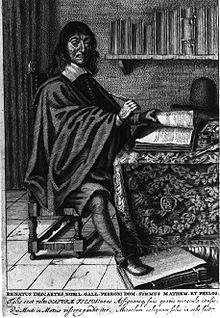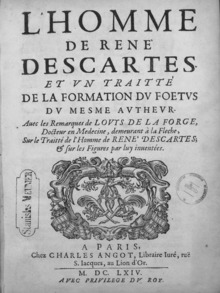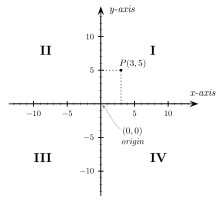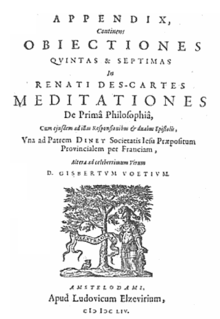René Descartes
In the opening section of the Passions of the Soul, an early modern treatise on emotions, Descartes goes so far as to assert that he will write on this topic "as if no one had written on these matters before."[19][note 5] He laid the foundation for 17th-century continental rationalism, later advocated by Spinoza and Leibniz, and was later opposed by the empiricist school of thought consisting of Hobbes, Locke, Berkeley, and Hume.[26] In 1607, late because of his fragile health, he entered the Jesuit Collège Royal Henry-Le-Grand at La Flèche,[27][28] where he was introduced to mathematics and physics, including Galileo's work.After graduation in 1614, he studied for two years (1615–16) at the University of Poitiers, earning a Baccalauréat and Licence in canon and civil law in 1616,[29] in accordance with his father's wishes that he should become a lawyer.Resolving to seek no knowledge other than that of which could be found in myself or else in the great book of the world, I spent the rest of my youth traveling, visiting courts and armies, mixing with people of diverse temperaments and ranks, gathering various experiences, testing myself in the situations which fortune offered me, and at all times reflecting upon whatever came my way to derive some profit from it.In accordance with his ambition to become a professional military officer in 1618, Descartes joined, as a mercenary, the Protestant Dutch States Army in Breda under the command of Maurice of Nassau,[29] and undertook a formal study of military engineering, as established by Simon Stevin.[36][37] According to Adrien Baillet, on the night of 10–11 November 1619 (St. Martin's Day), while stationed in Neuburg an der Donau, Descartes shut himself in a room with an "oven" (probably a cocklestove)[38] to escape the cold."[55] Russell Shorto speculates that the experience of fatherhood and losing a child formed a turning point in Descartes's work, changing its focus from medicine to a quest for universal answers.[note 7] In 1633, Galileo was condemned by the Italian Inquisition, and Descartes abandoned plans to publish Treatise on the World, his work of the previous four years.[57] In it, Descartes lays out four rules of thought, meant to ensure that our knowledge rests upon a firm foundation:[58] The first was never to accept anything for true which I did not know to be such; that is to say, carefully to avoid precipitancy and prejudice, and to comprise nothing more in my judgment than what was presented to my mind so clearly and distinctly as to exclude all ground of doubt.In La Géométrie, Descartes exploited the discoveries he made with Pierre de Fermat.In 1641, he published a metaphysics treatise, Meditationes de Prima Philosophia (Meditations on First Philosophy), written in Latin and thus addressed to the learned.[65] Christia Mercer suggested that Descartes may have been influenced by Spanish author and Roman Catholic nun Teresa of Ávila, who, fifty years earlier, published The Interior Castle, concerning the role of philosophical reflection in intellectual growth.[66][67] Descartes began (through Alfonso Polloti, an Italian general in Dutch service) a six-year correspondence with Princess Elisabeth of Bohemia, devoted mainly to moral and psychological subjects.[70] Challenging Blaise Pascal, Descartes took the first set of barometric readings in Stockholm to see if atmospheric pressure could be used in forecasting the weather.")[72] E. Pies has questioned this account, based on a letter by the Doctor van Wullen; however, Descartes had refused his treatment, and more arguments against its veracity have been raised since.[78] In a 2009 book, German philosopher Theodor Ebert argues that Descartes was poisoned by Jacques Viogué, a Catholic missionary who opposed his religious views.His manuscripts came into the possession of Claude Clerselier, Chanut's brother-in-law, and "a devout Catholic who has begun the process of turning Descartes into a saint by cutting, adding and publishing his letters selectively.[94] He gave reasons for thinking that waking thoughts are distinguishable from dreams, and that one's mind cannot have been "hijacked" by an evil demon placing an illusory external world before one's senses.[96] Descartes, influenced by the automatons on display at the Château de Saint-Germain-en-Laye near Paris, investigated the connection between mind and body, and how they interact.Everything that happened, be it the motion of the stars or the growth of a tree, was supposedly explainable by a certain purpose, goal or end that worked its way out within nature.[107] Descartes's discussion on embodiment raised one of the most perplexing problems of his dualism philosophy: What exactly is the relationship of union between the mind and the body of a person?[119] Although Descartes's views were not universally accepted, they became prominent in Europe and North America, allowing humans to treat animals with impunity.[96] In this way, he argues for the existence of God, investigates the place of man in nature, formulates the theory of mind–body dualism, and defends free will.[124] The moral writings of Descartes came at the last part of his life, but earlier, in his Discourse on the Method, he adopted three maxims to be able to act while he put all his ideas into doubt.Regarding epistemology, therefore, Descartes can be said to have contributed such ideas as a conception of foundationalism and the possibility that reason is the only reliable method of attaining knowledge.[157] This theory was supported by experience "It follows that one can understand why it thunders more rarely in winter than in summer; for then not enough heat reaches the highest clouds, in order to break them up.He believed that in order to make these exhalations viable to produce lightning, they had to be made "fine and inflammable" by hot and dry weather.[19][158] The first two of his Meditations on First Philosophy, those that formulate the famous methodic doubt, represent the portion of Descartes's writings that most influenced modern thinking.[164][166] This anthropocentric perspective of Descartes's work, establishing human reason as autonomous, provided the basis for the Enlightenment's emancipation from God and the Church."[174] In her 2018 interview with Tyler Cowen, Agnes Callard described Descartes's thought experiment in the Meditations, where he encouraged a complete, systematic doubting of everything that you believe, to "see what you come to".[179] In January 2010, a previously unknown letter from Descartes, dated 27 May 1641, was found by the Dutch philosopher Erik-Jan Bos when browsing through Google.









Descartes (disambiguation)Frans HalsLa Haye en TouraineStockholmCollège Royal Henry-Le-GrandUniversity of PoitiersUniversity of FranekerLeiden UniversityFrancine Descartes17th CenturyAge of EnlightenmentWestern philosophyDutch philosophyFrench philosophySchoolRationalismCartesianismMechanismInnatismFoundationalismConceptualismAugustinianismIndirect realismCorrespondence theory of truthCorpuscularianismTheological voluntarismThesisEpistemologymetaphysicsmathematicsphysicscosmologyethicsCogito ergo sumMethod of doubtSubjectivityMethod of normalsAnalytic geometryCartesian coordinate systemImaginary numberMind–body problemCartesian dualismInteractionismTrialismCartesian circleMathesis universalisFolium of DescartesDeus deceptorDream argumentConservation of momentumBalloonist theoryDescartes' Rule of SignsWax argumentTrademark argumentCausal adequacy principleRes cogitansres extensaDoubt and certaintyCogito, ergo sumEvil demonMind–body dichotomyCoordinate systemFoliumRule of signsCartesian diverRules for the Direction of the MindThe Search for TruthThe WorldDiscourse on the MethodLa GéométrieMeditations on First PhilosophyPrinciples of PhilosophyPassions of the SoulChristina, Queen of SwedenNicolas MalebrancheBaruch SpinozaGottfried Wilhelm Leibnizscientistmathematicianmodern philosophysciencegeometryalgebraDutch RepublicDutch States ArmyDutch Golden AgeProtestant stateRoman CatholicAristotelianismrevived StoicismAugustinenatural philosophyschoolscorporeal substancematterfinal endsGod's act of creationearly modernsyllogismSpinozaLeibnizempiricistHobbesBerkeleyWestern thoughtSpinozismAge of ReasonpolymathcalculusanalysisScientific RevolutionProvince of TouraineDescartesIndre-et-LoireParlement of RennesRennesPoitouHuguenotsJesuitLa FlècheGalileoBaccalauréatLicencecivil lawmercenaryProtestant